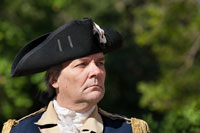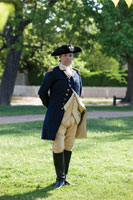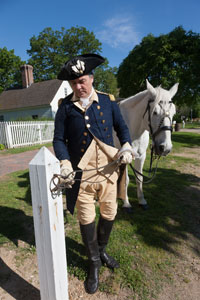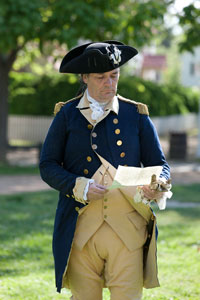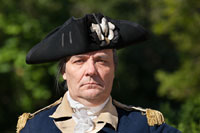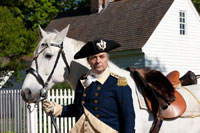Page content
Online Extras
Extra Images
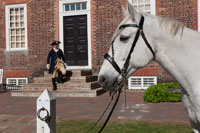
Dave Doody
Ron Carnegie as George Washington, above with his horse outside the Wythe House, his Williamsburg headquarters in 1781.
Peopling the Past: Meet George Washington
by Ed Crews
The Continental and French armies poured into Williamsburg during September 1781. Their goal was to lay siege to Lord Cornwallis’s British force trapped at Yorktown, and to compel its surrender. General George Washington, leading the American contingent, arrived eager for a fight and confident of victory. Ron Carnegie portrays the commander in chief. Speaking as the general might have, he discussed the impending battle. His comments have been edited and condensed.
Townspeople wonder what is about to happen.
We intend to besiege the British at Yorktown. The enemy is trapped. We control the surrounding land The French navy commands the sea. The British cannot escape. They cannot get more supplies or men. By the blessing of heaven, we will repel our cruel invader and see peace and liberty returned to these shores.
Is it wise to talk so openly of your intentions?
I see little harm in discussing these matters. A siege is inevitable and is the only practical military choice in this situation. I know it. The Comte de Rochambeau, who leads the French Army, knows it. Cornwallis knows it.
How will you conduct the battle?
Sieges always are done the same way. We will dig lines parallel to the enemy’s trenches. Using artillery barrages, we will reduce their forces, and their will to fight. We will draw our lines ever closer to theirs. Our soldiers may capture positions by assault. Even if they do not, sooner or later, the British will run out of food and ammunition.
How long the siege will take?
Only one being can tell. I believe the enemy can last about three months at most. Not only does Cornwallis have thousands of troops to feed, but his position is filled with runaway slaves, some of whom build and repair the fortifications. They do not have enough food to accommodate all those people for long.
Is the Continental Army ready for the fight?
The spirit of the men has never been better. They believe in victory. We’re on the verge of capturing an en- tire army, and that has not happened since 1777. We outnumber Cornwallis. The troops are well trained because of the singular efforts of Baron von Steuben, who drilled them and made soldiers of farmers, mechanics, and townsmen. I also am pleased to note that the Virginia militia serving here has many veterans. Are we ready, sir? Indeed, sir, we are.
And the French, can you rely on them?
We can and must. The French have sent thousands of troops as well as supplies and money. They have brought large siege weapons—howitzers and mortars. Their military engineers are the best in the world and know precisely how to plan and to execute a siege. Did you know that the Comte de Rochambeau is the veteran of twenty-four sieges? Our army has little or no experience in these matters. Remember, too, that the French are eager for revenge on a traditional enemy. The French also hope to regain possessions they lost in the West Indies. After the war, they want to establish strong trade ties with our nation. The British are in trouble, sir. They have been campaigning to no avail in the southern states for months. Their troops are exhausted. They are short on stores. Help cannot reach them in time. Honestly, I am a bit surprised. Cornwallis is the finest commander they have in North America, and I have no idea how he got himself into this situation.
Will victory at Yorktown end the war?
I do not believe it will. Ultimate victory requires taking New York. It is a strongpoint for the British. Holding New York allows them to separate the northeast states from the Mid-Atlantic. Yet seizing New York would be a formidable enterprise. The enemy has a strong garrison and impressive defenses. Plus, the Royal Navy can land supplies and reinforcements there at will. For now, though, New York will have to wait until we have finished the task at hand.
—INTERVIEW CONDUCTED, CONDENSED, AND EDITED BY ED CREWS
Editor’s note:
An installment in a series of first person, question-and-answer interviews with historic figures interpreted in Colonial Williamsburg’s Historic Area.

